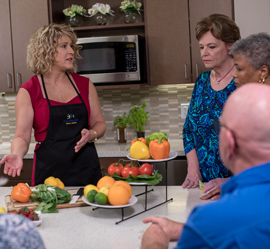Food plays a central role in all of our lives. Eating is both a way to sustain ourselves and an important part of our culture. People often mark major life events with a large feast—from wedding cakes to birthday cakes, beautiful holiday spreads with family to casual lunches with friends. Who doesn’t look forward to a great meal?
But as you age, your eating habits may change. Perhaps you are restricted to a special diet after developing an allergy or other condition. And over time life changes may make it more challenging to shop for and prepare regular meals. But there’s one thing will never change: the importance of healthy eating. You may already know foods you should include in a healthy diet, but do you know what you should avoid?
Here are eight foods that you should cut down on (or avoid eating altogether) as you get older, and why:
1. Raw or undercooked eggs, meat and poultry.
Undercooked foods such as eggs, meat, poultry and sushi can cause food poisoning, which can trigger sepsis and septic shock. Although anyone can develop infection and sepsis, seniors are at higher risk.
2. Grapefruit.
If you take certain medications to treat high blood pressure, anxiety or insomnia, you may have been advised not to eat grapefruit. The reason is because grapefruit and grapefruit juice can intensify the effects of some drugs, potentially making them dangerous. If your medication label says to avoid grapefruit, it is important to heed this warning.
3. High-sodium foods.
Too much salt can be a problem for older adults, especially if you have a history of hypertension. If your food is lacking flavor, try adding different types of herbs and spices rather than loading up with table salt. Additionally, always review the sodium content on nutritional labels. According to experts from the National Academies of Sciences, Health and Medicine Division, seniors over 71 should limit their sodium intake to no more than 1.2 grams per day.
4. Caffeine.
Caffeine not only keeps many people from getting a good night’s sleep, it may increase anxiety and make your heart beat more quickly or irregularly. This could be dangerous if you have a heart condition. Aside from coffee, caffeine is also found in many teas, some sodas, chocolate and even some medications, including over-the-counter pain killers.
5. Sodas and sugary drinks.
An ice-cold cola may seem tempting if you’re hot and thirsty, but sodas and many sports drinks contain a large amount of sugar. A cola can contain 39 grams of sugar in one 12-ounce serving, the equivalent of almost 10 teaspoons of sugar! If you have prediabetes, regular consumption of these types of drinks may raise your blood sugar to a diagnosis of diabetes. Excess sugar also leads to obesity and other health issues.
6. “Sugar-free” drinks.
At first glance, a drink or food product containing an artificial sweetener might seem to be a good alternative to products high in sugar, but they aren’t. Research has shown that artificial sweeteners contribute to weight gain and cause other health problems. Although the calories may be lower, you may be tempted to consume more of these products to satisfy a sweet tooth.
7. Alcoholic beverages.
Enjoying an occasional alcoholic beverage is harmless for many people. However, if you live with a chronic illness, such as diabetes, or you take certain types of medications, such as antihistamines, painkillers (analgesics) and medications for hypertension (high blood pressure), alcohol should be avoided.
8. Foods with empty calories.
Easy and fast foods, such as doughnuts and french fries, may satisfy your hunger pangs—but they won’t provide you with much-needed nutrients. Because many seniors become naturally less active as they get older, it becomes much more difficult to work off extra calories.
Eating a healthy diet is always a good idea, but as you get older, it can be even more important. By reducing or avoiding your intake of these foods, you can feel better and make your doctor happy, too.
Ready to take control of your weight and your health? Our resource center is full of helpful guides with tips and tricks you can use to live well throughout your retirement.

